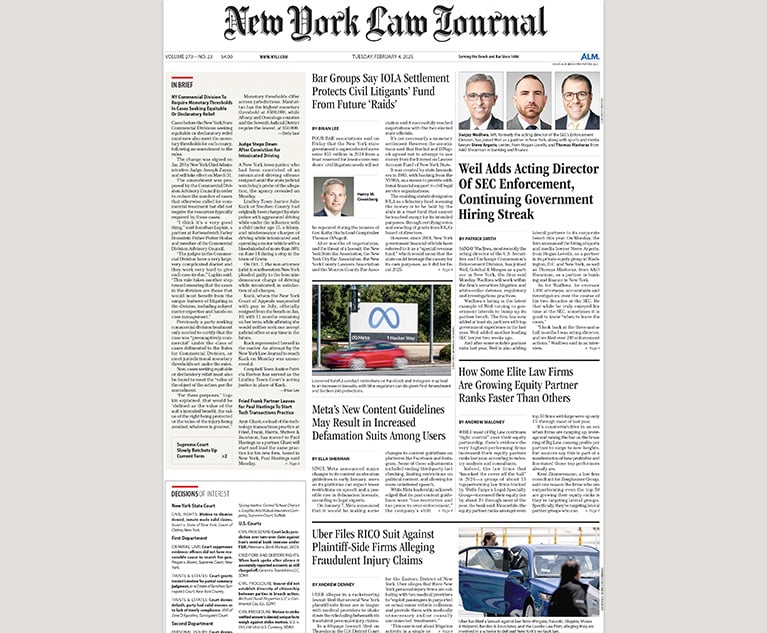Blank Rome Is in the Midst of Major Expansion Targeting NY and Other Strategic Cities
The firm's new managing partner is targeting New York, Los Angeles, Washington, D.C., and Chicago for an ambitious growth push, hoping to add as many as 400 lawyers in the next five years.
January 23, 2019 at 12:32 PM
6 minute read
The original version of this story was published on The Legal Intelligencer
 Blank Rome's offices in Washington, D.C. (Photo: Diego M. Radzinschi/ALM)
Blank Rome's offices in Washington, D.C. (Photo: Diego M. Radzinschi/ALM)
With a new managing partner in place and nearly three years after absorbing 100 lawyers from now-defunct Dickstein Shapiro, Blank Rome is looking to grow again.
The Philadelphia-based Am Law 100 firm spent the first three weeks of 2019 adding lawyers in highly competitive legal markets. According to managing partner Grant Palmer, much more is to come in New York, Los Angeles, Washington, D.C., and possibly Chicago.
“The Dickstein Shapiro group, it's taken two to three years to integrate them. We are now ready” to expand again, said Palmer in a recent interview. He officially took on his new role Jan. 1, joining chairman Alan Hoffman in leading the firm.
Blank Rome has already added a number of small groups in New York, Los Angeles and Washington, D.C., this year. They include a trio of energy lawyers from Cadwalader, a corporate partner from midsize firm Carlsmith Ball, a transactional partner from DLA Piper, a corporate partner from Baker McKenzie and a two-partner real estate team from Thompson & Knight. The firm also absorbed a small family law practice in Los Angeles, and it is planning to announce additional partner laterals in New York and Pittsburgh in the near future, Palmer said.
While the latest additions are all over the map in terms of geography, practice area and the lawyers' backgrounds, Palmer said they're all part of a plan.
 Grant Palmer of Blank Rome (Courtesy photo)
Grant Palmer of Blank Rome (Courtesy photo)Blank Rome is developing its strategy for the next three to five years, Palmer said. The main goal, he said, is to make the firm's offices across the country “equal to or greater than Philadelphia,” in terms of brand and reputation.
That's going to require significantly bulking up in those locations, he noted. While many managing partners shy away from stating head count goals, Palmer did not.
The firm has about 150 lawyers in New York, with room for up to 210 when it moves to a new office there June 1, he said. In Washington, D.C., he said, the firm is aiming to take its existing office from 125 attorneys to 175 or 200.
In Los Angeles, Palmer said, he hopes to reach about 100 lawyers—nearly double the current 60—within three to five years. And in the Houston office, where there are about 50 lawyers now, the goal is to have between 75 and 100, he said. Blank Rome may also look to open new offices in other parts of Texas and California, he added.
And there's one more location where Blank Rome may be poised to grow from scratch: the Midwest, most likely Chicago.
“We're open to any opportunity in Chicago that we think makes sense for the firm and our clients,” Palmer said. That would preferably involve acquiring an established group, he said, but the firm isn't entirely opposed to stringing together individuals and smaller groups to build a Chicago office.
In all, Palmer said, Blank Rome will need to be about 800 to 1,000 lawyers in the next five years to reach its goals, up from about 600 today.
Asked whether Blank Rome would complete another combination like the one it did with Dickstein Shapiro, Palmer said it's not impossible, but noted “that was a unique opportunity. It's unusual to find a group that talented all looking for a new firm.” Still, he said, bringing on another group of similar size wouldn't be a problem, but a merger of equals is highly unlikely.
Aside from geography and size, the firm will spend the next year determining which industries will be central to its vision, he said. Its banking and finance, real estate and maritime practices serve as models, Palmer said, as Blank Rome works toward shaping its business around industry groups.
“It's not something we haven't been doing,” he said, with regard to organizing by targeted industries. “But I don't think there's been enough focus on it.”
Focused on Philadelphia, But 'Not a Philadelphia Firm'
It's not as though Blank Rome's national expansion is just now beginning. The firm has 13 offices and was ranked 80th on the National Law Journal's 2018 ranking of the 500 largest law firms by head count.
“When I joined this law firm in 1990, it was a Philadelphia law firm,” Palmer said. But now, he contends, “This is no longer [just] a Philadelphia law firm.”
Still, it faces stiff competition in the cities where it's targeting growth, which also happen to be the four cities with the largest lawyer populations, according to the NLJ 500.
Among the Am Law 200 firms founded in Pennsylvania, Blank Rome is not alone in looking outside the state for growth opportunities. In recent years, for instance, firms like Ballard Spahr, Saul Ewing Arnstein & Lehr and Fox Rothschild have pursued growth beyond state lines through mergers in the Midwest and the Southeast.
At the same time, large firms based outside of Pennsylvania have taken an interest in the market, often luring large groups from native firms. They include Holland & Knight, Armstrong Teasdale, Akin Gump Strauss Hauer & Feld and Lewis Brisbois, all of which added groups in Philadelphia within the past year.
Despite its goals in other markets, Palmer said Blank Rome will not abandon its focus on Philadelphia.
He noted that other Philadelphia-born firms have built their brands nationally while maintaining a strong base in Philadelphia, using Morgan Lewis & Bockius as an example. Firms that have integrated their national presence successfully appointed leaders in their non-Philadelphia offices, he said.
“There is not a lot of room for additional growth in the Philadelphia market,” he said. But the group of core partners in Philadelphia “value our investing in New York and other markets because it's good for their clients.”
READ MORE:
Blank Rome Appoints New Managing Partner in Leadership Shuffle
This content has been archived. It is available through our partners, LexisNexis® and Bloomberg Law.
To view this content, please continue to their sites.
Not a Lexis Subscriber?
Subscribe Now
Not a Bloomberg Law Subscriber?
Subscribe Now
NOT FOR REPRINT
© 2025 ALM Global, LLC, All Rights Reserved. Request academic re-use from www.copyright.com. All other uses, submit a request to [email protected]. For more information visit Asset & Logo Licensing.
You Might Like
View All

How Some Elite Law Firms Are Growing Equity Partner Ranks Faster Than Others
4 minute read
Law Firms Expand Scope of Immigration Expertise Amid Blitz of Trump Orders
6 minute readTrending Stories
- 1Thursday Newspaper
- 2Public Notices/Calendars
- 3Judicial Ethics Opinion 24-117
- 4Rejuvenation of a Sharp Employer Non-Compete Tool: Delaware Supreme Court Reinvigorates the Employee Choice Doctrine
- 5Mastering Litigation in New York’s Commercial Division Part V, Leave It to the Experts: Expert Discovery in the New York Commercial Division
Who Got The Work
J. Brugh Lower of Gibbons has entered an appearance for industrial equipment supplier Devco Corporation in a pending trademark infringement lawsuit. The suit, accusing the defendant of selling knock-off Graco products, was filed Dec. 18 in New Jersey District Court by Rivkin Radler on behalf of Graco Inc. and Graco Minnesota. The case, assigned to U.S. District Judge Zahid N. Quraishi, is 3:24-cv-11294, Graco Inc. et al v. Devco Corporation.
Who Got The Work
Rebecca Maller-Stein and Kent A. Yalowitz of Arnold & Porter Kaye Scholer have entered their appearances for Hanaco Venture Capital and its executives, Lior Prosor and David Frankel, in a pending securities lawsuit. The action, filed on Dec. 24 in New York Southern District Court by Zell, Aron & Co. on behalf of Goldeneye Advisors, accuses the defendants of negligently and fraudulently managing the plaintiff's $1 million investment. The case, assigned to U.S. District Judge Vernon S. Broderick, is 1:24-cv-09918, Goldeneye Advisors, LLC v. Hanaco Venture Capital, Ltd. et al.
Who Got The Work
Attorneys from A&O Shearman has stepped in as defense counsel for Toronto-Dominion Bank and other defendants in a pending securities class action. The suit, filed Dec. 11 in New York Southern District Court by Bleichmar Fonti & Auld, accuses the defendants of concealing the bank's 'pervasive' deficiencies in regards to its compliance with the Bank Secrecy Act and the quality of its anti-money laundering controls. The case, assigned to U.S. District Judge Arun Subramanian, is 1:24-cv-09445, Gonzalez v. The Toronto-Dominion Bank et al.
Who Got The Work
Crown Castle International, a Pennsylvania company providing shared communications infrastructure, has turned to Luke D. Wolf of Gordon Rees Scully Mansukhani to fend off a pending breach-of-contract lawsuit. The court action, filed Nov. 25 in Michigan Eastern District Court by Hooper Hathaway PC on behalf of The Town Residences LLC, accuses Crown Castle of failing to transfer approximately $30,000 in utility payments from T-Mobile in breach of a roof-top lease and assignment agreement. The case, assigned to U.S. District Judge Susan K. Declercq, is 2:24-cv-13131, The Town Residences LLC v. T-Mobile US, Inc. et al.
Who Got The Work
Wilfred P. Coronato and Daniel M. Schwartz of McCarter & English have stepped in as defense counsel to Electrolux Home Products Inc. in a pending product liability lawsuit. The court action, filed Nov. 26 in New York Eastern District Court by Poulos Lopiccolo PC and Nagel Rice LLP on behalf of David Stern, alleges that the defendant's refrigerators’ drawers and shelving repeatedly break and fall apart within months after purchase. The case, assigned to U.S. District Judge Joan M. Azrack, is 2:24-cv-08204, Stern v. Electrolux Home Products, Inc.
Featured Firms
Law Offices of Gary Martin Hays & Associates, P.C.
(470) 294-1674
Law Offices of Mark E. Salomone
(857) 444-6468
Smith & Hassler
(713) 739-1250







